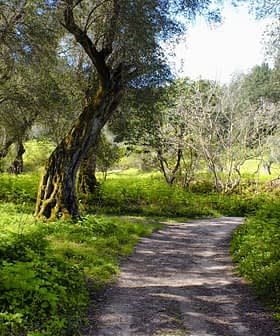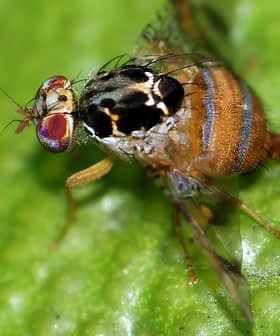In Greece, Olive Trees Suffer From Fruit Fly Infection Ahead of Harvest
The unstable weather of the past summer and the lack of resources to fight the fly are to blame for an ominous outlook.
 Groves at Laconiko in Laconia, Greece (File Photo)
Groves at Laconiko in Laconia, Greece (File Photo)Last year’s olive harvest in Greece beat expectations, with almost 350,000 tons of oil coming out of the mills. The rich production came after the much-debated drought had minimal effects and there was practically no fruit fly invasion that would degrade both the quality and the quantity of the olive oil.
This is an empty season for us. We expect to get only 40 percent of last year’s production.
But this season is a different story with the harvest expected to be slimmer mainly due to the production cycle of the olive trees, and the olive fruit fly has again made its presence felt in many areas of the country.
The lack of the usual heat waves that hit Greece every summer and that would render the fly inactive, combined with the unnaturally high levels of rain, enabled the pest to reproduce and threaten the forthcoming production. A single female fruit fly can deliver about 200 eggs and after a month the new flies emerge with half of them being females able to make 200 eggs more. They exponentially increase their presence and it becomes hard to contain them if they start hatching.
Giorgos Korinnis, an agriculturist working in Lakonia, which traditionally makes top-quality olive oil, told Olive Oil Times that the infestation from the fruit fly is more than obvious this season.
“This is an empty season for us,” Korinnis said. “We expect to get only 40 percent of last year’s production which was around 25,000 tons of olive oil for the whole region, and a significant part of it will come from olives infected with the fruit fly. So, due to the damage the fly causes, I wouldn’t be surprised to see olive oils with an acidity level of 0.5 or 0.6 when we normally get 0.2 or 0.3, meaning that a big part of the oil crop will be of lower quality than what we usually get here.”
Korinnis also explained that the problem started with the mild weather conditions that prevailed during the summer. “We had no temperatures exceeding 35°C (95°F), so the fly could easily reproduce itself. And many growers did not bother to use any pesticides to get rid of the fly since they weren’t expecting any serious yield, so the fly got the chance to incubate in their trees subsequently contaminating neighboring olive groves with better prospects and affecting this way the olive oil crop of the whole area.”
Konstantinos Papadopoulos of the Papadopoulos Olive Oil Mill near ancient Olympia, told OOT there is an outbreak of the olive fruit fly in the area. Some producers took measures to reduce the damage, but the majority unable to do so mostly due to limited budget. “Some of the producers we work with will get quality olive oil this season, but generally we expect a very low yield of inferior quality,” he noted.
In Crete, Peza Union near Heraklion is a big association of olive oil producers. They told us that until now the fruit fly was only active in small pockets all over the district, but they expect it to spread since there is not going to be any more pesticide application in the fields due to lack of resources. Nevertheless, and contrary to the situation in most parts of the country, they expect an increased production by 20 to 30 percent compared to last year.
Reports are also coming in from other olive oil-making territories of the country, indicating that the situation is grim.
The island of Lesvos, with its distinctive yellowish olive oil, is on the verge of losing much of its production due to the extended fruit fly infection, according to producers. Weather and the slow response by farmers made it easy for the fly to nest and reproduce. The local administration added that organic olive groves, which constitute 25 percent of the island’s olive tree cultivations, also contributed to the fly’s spreading since their owners avoided using any means to contain it in order to protect their organic identity.
In the Aetolia-Acarnania region in Central Greece, there are many olive groves infected by the fly and the local producers expect a lesser production than the previous season. To add insult to injury, many trees that were untouched by the fly were hit by hail that punched the olive fruits to the ground and left producers in despair.
In the neighboring area of Lokrida, almost all of the olive oil production of the area is expected to be affected by the fruit fly. The producers accused the authorities of being sluggish in applying measures to destroy the fly and asked for compensation.
There is also a notice coming from the authorities of Northern Greece for a very high activity of the fruit fly near the city of Alexandroupoli and other areas, urging the producers there to use pesticides to minimize the loss.
Back in the day, producers in Greece used to say that a hot and dry summer is all that is needed for olive oil of excellent quality. But now, with the weather constantly changing, the old wisdom is not enough and growers and producers have a lot of parameters to consider for a successful olive oil crop.









